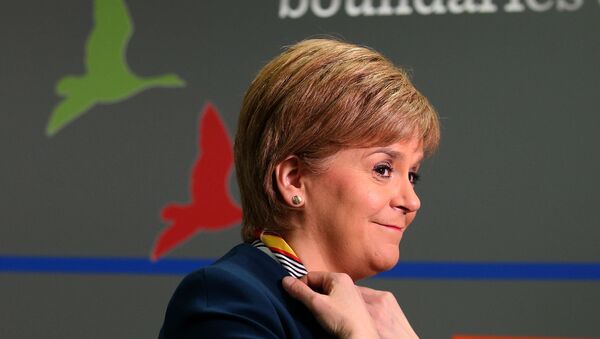Polling data published January 9 revealed that despite Scottish First Minister Nicola Sturgeon's vocal demands that Scotland be allowed to remain inside the European Union's Single Market, a majority of Scots are against adopting different regulation and immigration systems to the rest of the UK.
Scots by a majority want oot the EU Single Market and same immigration controls on EU country nationals as rest of UK, per poll by Sir John Curtice.
— Open Britain (@OpenBritain) 10 January 2018
Nicola, when will you get back to your day job of representing the majority of Scots in the Union?#Brexit #SNPFail pic.twitter.com/06iio1GWM0
The work, carried out by Sir John Curtice, one of the UK's most eminent psychologists, at the University of Strathclyde, found that at least 63 percent of Scots surveyed believed that immigration requirements should not be more liberal than the rest of Britain, while 67 percent believed that the rules for trade with the EU should be the same across the entirety of the UK.
Speaking to Sputnik, Professor Curtice explained the apparent contradiction between the 62 percent Remain vote in Scotland in 2016 and largescale opposition to remaining in the Single Market.
"The explanation is relatively straightforward and that is there are quite a few Remain voters on both sides of the border who would actually like to see an end to freedom of movement," he said.
Professor Curtice cautioned against inferring peoples' political stances based on how they have voted in previous referenda on separate issues.
"Leave voters across the UK are almost as keen on maintaining free trade as Remain voters. When it comes to what Brexit should mean, Remain voters and Leave voters don't always disagree so much."
Since the 2016 Brexit result, the ruling Scottish National Party in Edinburgh has sought to galvanize support for a second referendum on independence as a way of keeping the country inside the European Union. The findings of Professor Curtice however, have not revealed a discernable rise in nationalist sentiment.
"There is virtually no relationship between how people voted in 2014 and how they voted in 2016. Those who voted in favor of independence were probably slightly more likely to vote Remain but there isn't that much of a correspondence."
As well as showing significant support for remaining attached to the United Kingdom, the survey also revealed that a majority of Scots polled, around 60 percent, believed that areas in which policy on things such as fishing and farming which are currently decided by the EU in Brussels should be brought under the control of the Scottish Government in Edinburgh.
The results come despite the overwhelming turnout in favor of the Remain campaign in Scotland during the 2016 Brexit referendum, alongside Northern Ireland and London. The Leave campaign however prevailed in England and Wales on the other hand deciding the outcome of the poll.


